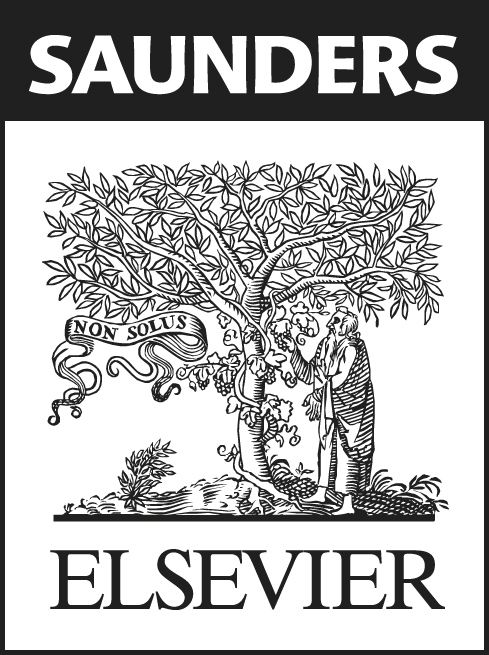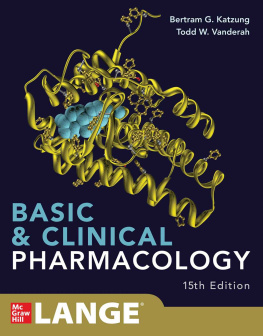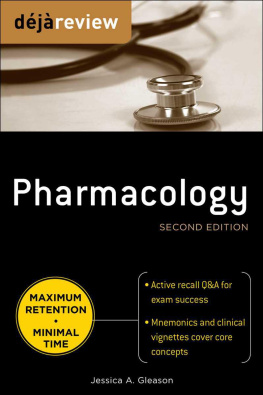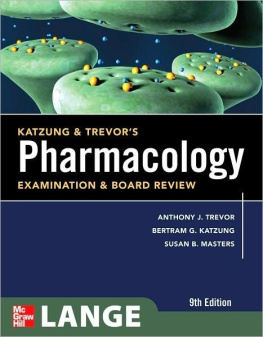Pharmacology
Third Edition
George M. Brenner, Ph.D.
Chair and Professor Emeritus of Pharmacology, Oklahoma State University, Center for Health Sciences, Tulsa, Oklahoma
Craig W. Stevens, Ph.D.
Chair and Professor of Pharmacology, Oklahoma State University, Center for Health Sciences, Tulsa, Oklahoma
Copyright 2009 Elsevier Inc.
Saunders
Front Matter
Pharmacology
THIRD EDITION
George M. Brenner, Ph.D.
Chair and Professor Emeritus of Pharmacology, Oklahoma State University, Center for Health Sciences, Tulsa, Oklahoma
Craig W. Stevens, Ph.D.
Chair and Professor of Pharmacology, Oklahoma State University, Center for Health Sciences, Tulsa, Oklahoma

Copyright

1600 John F. Kennedy Blvd.
Ste 1800
Philadelphia, PA 19103-2899
PHARMACOLOGY, THIRD EDITION ISBN: 978-1-4160-6627-9
Copyright (c) 2010 by Saunders, an imprint of Elsevier Inc.
.
Notice
Knowledge and best practice in this field are constantly changing. As new research and experience broaden our knowledge, changes in practice, treatment and drug therapy may become necessary or appropriate. Readers are advised to check the most current information provided (i) on procedures featured or (ii) by the manufacturer of each product to be administered, to verify the recommended dose or formula, the method and duration of administration, and contraindications. It is the responsibility of the practitioner, relying on their own experience and knowledge of the patient, to make diagnoses, to determine dosages and the best treatment for each individual patient, and to take all appropriate safety precautions. To the fullest extent of the law, neither the Publisher nor the Authors assume any liability for any injury and/or damage to persons or property arising out of or related to any use of the material contained in this book.
The Publisher
Previous editions copyrighted 2000, 2006
Library of Congress Cataloging-in-Publication Data
Brenner, George M.
Pharmacology/George M. Brenner, Craig W. Stevens. 3rd ed.
P.; cm.
Includes bibliographical references and index.
ISBN 978-1-4160-6627-9
1. Pharmacology. I. Stevens, Craig W. II. Title.
[DNLM: 1. Pharmacologymethods. 2. Drug Therapy. 3. Pharmaceutical Preparations. QV 4 B838p 2010]
RM300.B74 2010
615'.1dc22 2008043220
Acquisitions Editor: Kate Dimock
Developmental Editor: Nicole DiCicco
Production Manager: David M. Saltzberg
Design Direction: Karen O'Keefe Owens
Printed in China
Last digit is the print number: 9 8 7 6 5 4 3

PREFACE
Medical pharmacology is primarily concerned with the mechanisms by which drugs relieve symptoms and counteract the pathophysiological manifestations of disease. It is also concerned with the factors that determine the time course of drug action, including drug absorption, distribution, biotransformation, and excretion. Students are often overwhelmed by the vast amount of pharmacologic information available today. This textbook provides the essential concepts and information that students need to be successful in their courses without an overwhelming amount of detail.
This text is primarily intended for students who are taking their first course in pharmacology, but it will also be useful for those who are preparing to take medical board or licensing examinations. Because of the large number of drugs available today, this text emphasizes the general properties of drug categories and prototypical drugs. Chapters begin with a drug classification box to familiarize students with drug categories, subcategories, and specific drugs to be discussed in the chapter.
Throughout the book, pharmacologic information is organized in the same format, with sections on mechanisms of action, physiologic effects, pharmacokinetic properties, adverse effects and interactions, and clinical uses for each drug category. Numerous illustrations are used to depict drug mechanisms and effects, while well-organized tables compare the specific properties of drugs within a therapeutic category. At the end of each chapter, a summary of important points is provided to reinforce concepts and clinical applications that are crucial for students to remember. Review questions and selected readings are also included to test the reader's comprehension and lead to further study.
Several changes have been incorporated into the third edition of this text. We have revised each chapter to incorporate new drugs and drug categories, as well as to update new findings from the pharmacology literature on the mechanisms of action and therapeutic use. Importantly, approved drugs that were taken off the market are highlighted, as well as revised warnings of existing drugs added to prescription guidelines since the last edition.
This book would not have been possible without the advice and encouragement of mentors, colleagues, and editorial personnel. We are especially thankful for the time and effort made by John R. Brenner, DO, and Vivian M. Stevens, PhD, in reviewing parts of the revised text. Finally, we are particularly appreciative to Kate Dimock and Nicole DiCicco at Elsevier Inc. for their helpful assistance and support throughout the production of this book.
George M. Brenner, Ph.D.
Craig W. Stevens, Ph.D.
Section I
Principles of Pharmacology
CHAPTER 1 Introduction to Pharmacology
PHARMACOLOGY AND RELATED SCIENCES
Pharmacology is the study of drugs and their effects on life processes. It is a fundamental science that sprang to the forefront of modern medicine with demonstrated success in treating disease and saving lives. It is also a discipline that drives the international pharmaceutical industry to billion-dollar profits. This chapter reviews the history and subdivisions of pharmacology and discusses, in detail, the types of drugs, formulations, and routes of administration.
History and Role of Pharmacology
Since the beginning of the species, people have treated pain and disease with substances derived from plants, animals, and minerals. However, the science of pharmacology is less than 150 years old, ushered in by the ability to isolate pure compounds and the establishment of the scientific method. Historically, the selection and use of drugs were based on superstition or on experience (empiricism).
In the first or earliest phase of drug usage, noxious plant and animal preparations were administered to a diseased patient to rid the body of the evil spirits believed to cause illness. The Greek word pharmakon, from which the term pharmacology is derived, originally meant a magic charm for treating disease. Later, pharmakon came to mean a remedy or drug.
In the second phase of drug usage, experience enabled people to understand which substances were actually beneficial in relieving particular disease symptoms. The first effective drugs were probably simple external preparations, such as cool mud or a soothing leaf, and the earliest known prescriptions from 2100 BCE included salves containing thyme. Over many centuries, people learned the therapeutic value of natural products through trial and error. By 1500 BCE, Egyptian prescriptions called for castor oil, opium, and other drugs that are still used today. In China, ancient scrolls from this time listed prescriptions of herbal medicines for more than 50 diseases. Dioscorides, a Greek army surgeon who lived in the 1st century, described more than 600 medicinal plants that he collected and studied as he traveled with the Roman army. Susruta, a Hindu physician, described the principles of Ayurvedic medicine in the 5th century. During the Middle Ages, Islamic physicians (most famously Avicenna) and Christian monks cultivated and studied the use of herbal medicines.








